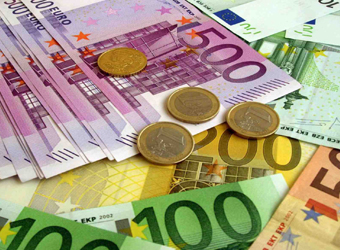The euro extended gains to a 2-1/2-year high against the dollar on Monday after the European Central Bank president held back from talking down the currency and as markets worried about the impact of Tropical Storm Harvey on the U.S. economy.
The euro was a shade higher at $1.1924 after rising to $1.1966, its highest since January 2015.
The common currency had already surged about 1 percent on Friday after ECB President Mario Draghi spoke at the Jackson Hole conference on subjects such as global trade but did not touch upon the euro’s recent strength.
The euro had gained an initial lift against the dollar after Federal Reserve Chair Janet Yellen made no reference to U.S. monetary policy at Jackson Hole.
“I don’t think expectations were that high in the market that Draghi would talk down the euro at Jackson Hole. Even if he had done so, the euro likely would have risen anyway,” said Masafumi Yamamoto, chief forex strategist at Mizuho Securities. “A strong euro cannot be a source of complaint for a region like the eurozone which is blessed with a large current account surplus, a steady economy and is not threatened by deflation. It was thus an opportunity for speculators to buy the euro without much concern.”
“A strong euro cannot be a source of complaint for a region like the eurozone which is blessed with a large current account surplus, a steady economy and is not threatened by deflation. It was thus an opportunity for speculators to buy the euro without much concern.”
The euro was expected to remain firm, at least in the short term, with investor focus on the ECB and whether it announces plans to reduce debt-buying at its September policy meeting.
“The main scenario remains a one in which the ECB deliberately schedules the tapering of its bond purchases, with eligible German debt for the ECB to buy beginning to run out and purchases of Italian bonds also testing the central bank’s capital key limits,” said Makoto Noji, senior strategist at SMBC Nikko Securities.
Eligible German bonds for the ECB to purchase for its debt-buying program have shown signs of drying up while the central bank has recently bought more Italian bonds than its own self-imposed “capital key” rules allow.
With much of the immediate focus on the euro after Jackson Hole, the dollar did not fare as badly against the Japanese yen.
The greenback was down 0.2 percent at 109.175 yen. It remained clear of the four-month low of 108.605 touched on Aug. 18.
The Swiss franc stood near a one-month high of 0.9539 franc per dollar touched earlier in the session. The franc had surged 0.9 percent on Friday.
The pound was down 0.1 percent at $1.2884 after briefly touching a 13-day peak of $1.2946.
The dollar index fell 0.25 percent against a basket of six major currencies to 92.501, adding to Friday’s losses. It plumbed 92.372, its lowest since early May 2016.
“Markets (were) disappointed on the Yellen speech and they sold the dollar and pushed bond yields down,” said Imre Speizer, Westpac markets strategist.
He said Harvey would likely further weigh on the U.S. dollar because it was “a major negative weather event” and “obviously bad for the economy”.
Catastrophic flooding inundated Houston on Sunday. The Gulf Coast is home to about half of the U.S. refining capacity.
The Australian dollar was 0.1 percent higher at $0.7939 and the New Zealand dollar rose 0.05 percent to $0.7240.
Source: Reuters


